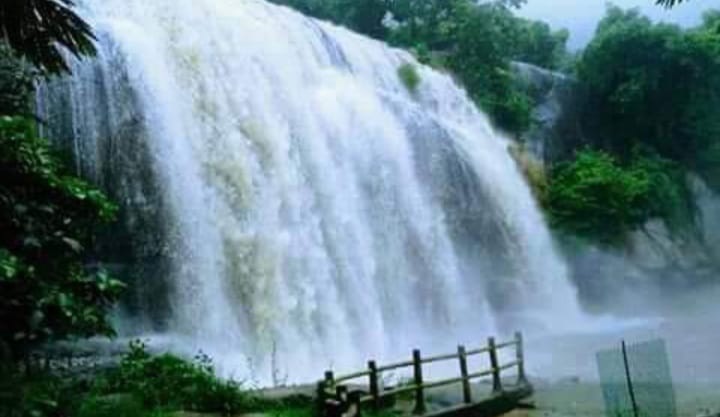Berhampur: Gandahati waterfall in Odisha’s Gajapati district, which is thronged by tourists in summer, wears a deserted look this season as it has almost dried up.
The waterfall, which splits into multiple falls creating a stunning view particularly during monsoon, has almost reduced to a streak of water flowing down the giant rock, a phenomenon which is witnessed for the first time.
Many tourists come to Gandahati waterfall, located 30 km away from Paralakhemundi and 153 km from Berhampur, during summer to cool themselves from heat.
Most of the local farmers said they have never seen the waterfall dried up earlier even during peak of summer. Its scenic beauty and dense forest attract large numbers of visitors from different parts of Odisha throughout the year.

According to the locals, there has been less rainfall in Mahendra mountain range this year. As a result, the waterfall, which sources its water from the range, has dried up.
“The waterfall has almost dried up. This alarming phenomenon is linked to the shortsighted monoculture cashew plantation policy of the government. The failure of planners to consider the ecological repercussions of cashew farming has led to devastating consequences for our precious ecosystem. Cashew cultivation, with its extensive water requirements and soil degradation, has severely impacted our water sources,” said Sanjay Jena, a local farmer.
Cashew plantation has replaced about 90% of the traditional forest trees in the area which may have depleted ground water level, reduced moisture in the biosphere and prevented decomposition of leaves. The water source of the stream may have dried up subsequently.
The recent move of massive rubber tree plantation in the area would further worsen the situation, said Sanjaya, a mechanical engineer.
“I urge the policymakers to heed this wake-up call. It’s time to prioritise sustainable planning and safeguard our natural treasures for future generations. I sincerely appeal to the Central and Odisha governments, Gajapati district administration and the citizens of Gajapati to work together to halt the destructive effects of monoculture and embrace practices that promote biodiversity and ecosystem resilience. Instead of cashew and rubber plantation, we should opt for plantation of jackfruit, mango and Amla or the Indian Goose Berry,” he added.


